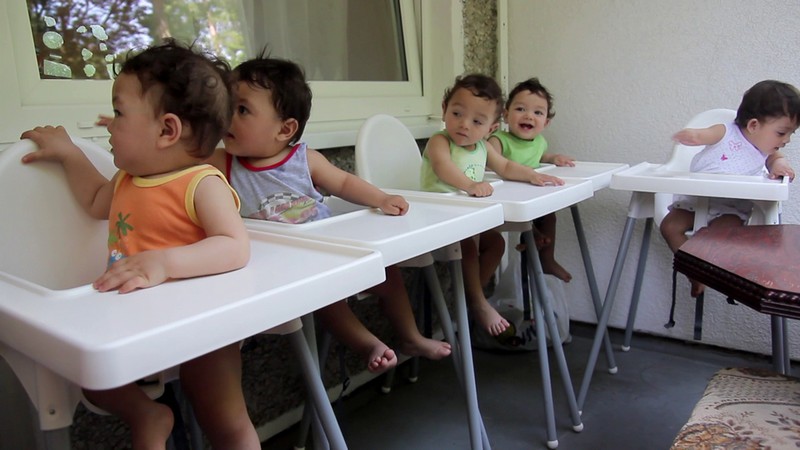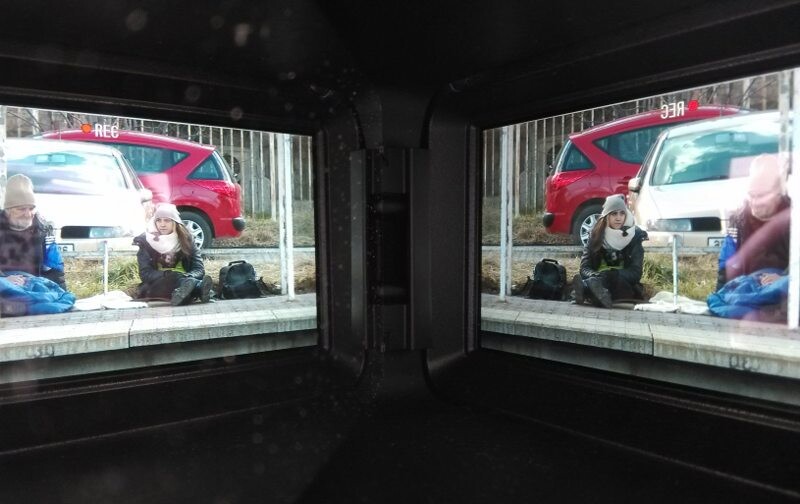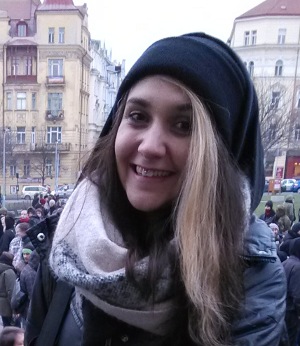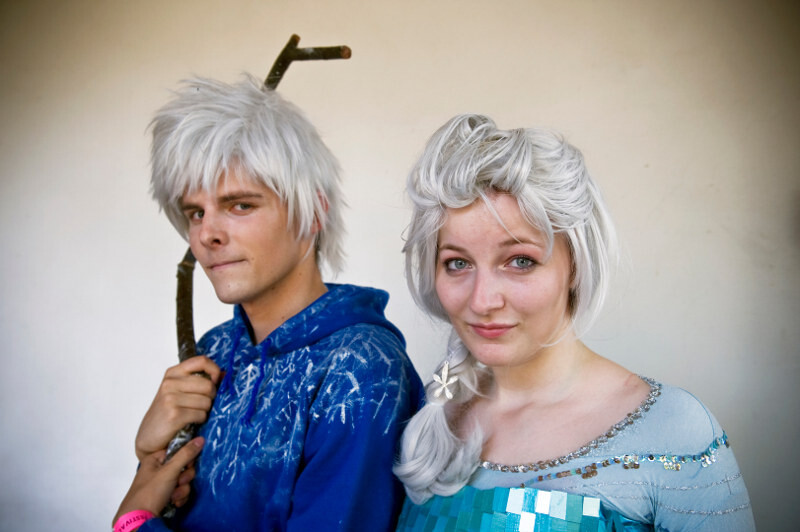Television Can Also Cultivate People
For documentary filmmaker Apolena Rychlíková public television is an important form of media. She comes up with ideas for new projects, such as the creative cycle Expremiéři (Ex-premiers), but she also contributes to established series such as Nedej se (Don‘t Give Up). The following interview is about television, but is also working in pairs and her last piece Za Adolfa by žádní morgoši neměli žádný práva (If Adolf Hitler Lived There Would Be No Rights for Gypsies). It takes a look at a day in the life of a Roma family, into which quintuplets were born, but also shows the wave of hatred and xenophobia that this event triggered amongst the Czech public.
The film Za Adolfa by žádní morgoši neměli žádný práva is based on confronting everyday activities and hateful comments from internet discussions. Was this concept clear from the beginning?
I really wanted to create a purely conceptual film. My last piece, Rodina (Family), was slow, intuitive and spiritual, so I wanted to do something edgy and methodologically constricted. Actually, we were lucky to have been contacted by the initiative Ne rasismu (No to Racism), to make a movie which would capture racism in the Czech Republic. We searched for a long time, and reached the conclusion, that we do not want to regurgitate theory from the field of social work, because often racism is not something rational, but is purely an emotional thing. We felt that the fact that the internet was overrun by hate speech geared towards the quintuplets was the quintessence of racism in our country.
You now often film with other directors. Is it different from working solo?
I have been thinking about that a lot lately. Martina Malinová and I want to shoot another film. We have written a script with Pavla Sobotová, and will soon begin filming with Martin Kohout. Before, it never occurred to me that I could work in a pair. Part of it, I think, has to do with the fact that having a child diminishes part of your ego. Suddenly, I gained a greater need to be inspired by others, by the very presence of someone else during filming. It’s a similar situation with Vladimír Turner, with whom I am now shooting the film about the social centre Klinika (Clinique), and it touches somewhat also on the squatter movement. It is an equal spontaneous approach, and for me it is a certain training for collective work, which we would like to apply in a currently forming film collective with Tereza Reichová.
Is form or style something secondary to you?
I often feel this conflict when working on television projects. Often, we are trying to approach an episode from an established cycle in a non-television-like fashion, but we still end up trying to improve the form at the expense of the topic. On the contrary, I think that quality films with talking heads of the classic American format are absent here. Movies of Martin Kohout come closest; sometimes, jokingly, I say that thanks to this conscious resignation regarding form, he is the most radical out of us all. It is a train of thoughts linked only by the topic. Knowing how to work with tempo and shooting talking heads in an environment that is not forced, is underrated. We would like to apply this with Martin in the upcoming project about the history of leftist thinking in our country. This form was rejected with the arrival of situational documentaries and remained abandoned after the beginning of observative and aesthetized documentaries, which come close to feature films. I actually try not to slip into form for the sake of form.

If Adolf Hitler Lived There Would Be No Rights for Gypsies
What role does public television play for you?
From my perspective it's an extremely important platform. I find it silly to say that television is some kind of an ugly institution with which artists should not collaborate. For me, with my issues and approach to form, it is actually a suitable medium. Of course, one has to get used to certain conditions, such as a limited number of shooting days or time spent in the film editing room. Conditions under which filming takes place usually affect the final form of the piece of work and in fact also the whole atmosphere of filming. Besides, it is media that is reluctant to serve people things which they do not wish to see, as we say with Karel Vachek. I think it should be necessary for film critics to constantly pay attention to television and what is more, to do it in a European context. Now TV cannot rely on anything other than peoplemeters.
Television sees itself as a generator of taste. We realized that with Ex-premiers. According to Czech Television, it does not appear to be a good project, although it fulfils most parameters of one. From festival awards, it made it to the media, and had relatively high viewer ratings. Even so, it is to some degree perceived as a project of student dilatants. It is a shame that television does not see documentaries as important, particularly at a time when some private companies and advertising agencies see them as a better communication channel even in comparison to feature film or actual advertisements.
You film quite a lot for established television series, for example, Nedej se a Náš venkov (Our Countryside). Is it a different kind of cooperation with television compared to preparing a creative cycle such as Ex-premiers?
With Ex-premiers it was a case of showcasing documentary practices of individual authors, we wanted to enforce a purely creative and open project, with which we succeeded in the end. With the project, Nedej se, I appreciate the fact that with the arrival of Peter Kubica and under the leadership of Pavel Bezouška we managed to create an open platform with a clear structure out of that series. An open call is made. Anyone can apply with a concrete issue, which I consider to be very transparent. It also connects FAMU as a public university with a public institution, which I think should work automatically. With Vladimír Turner we first filmed an episode called Neskloň se! (Don’t Bow Down!) concerning squatting, derelict houses, alimony and private property. Then we filmed O Klinice (About Clinique) and then Náš venkov concerning the issue of homelessness in villages and small towns. It is different filming for formats with an audience of around 100 000 people, which are looked down on by many and it is a challenge trying to elevate the genre, so that just another film about ploughing a field isn’t created. It is actually an attempt to infiltrate television through the most established television formats. I believe, without wanting to sound elitist, that television can also cultivate people.
You thought about filming your graduate film about the image of Václav Havel. Does this still hold true?
I do not know yet. A film about Havel is one of my big dreams. The original inspiration came from the film I'm Not There. The way Todd Haynes approached the Dylan myth, was the fairest, I thought. He had different people play him and created a piece that worked on a dreamlike level. How else should one shoot about controversial figures, other than by deflecting them and allowing them to permeate the entire spectrum of different forms? It still is a terribly complicated question for me. Since I tend to give into subjects that upset me the most, I am now intensively thinking that the graduate film could even be about the homeless.
Actually, I am quite worried about shooting about Havel, I'm afraid it would be a film that would anger completely everyone. On the other hand, the freedom that FAMU provides us with, cannot be compared to anything, so I wonder if I ever could shoot such a film other than at school.
How do you perceive the image of Havel in TV series České století (Czech century)?
To me, this is one of the best television works of the past few years. Especially, the episode about Havel was one of our best post-revolution cinematic undertakings. While people welcomed the portrayal of president Beneš and other figures in a critical manner, as soon as Havel was touched upon, everyone said, “Vašek wasn’t like that. I know him differently.” Masaryk and Beneš certainly also were not the same as portrayed in the film. It’s like, suddenly, everyone forgot they were watching a feature film. Yet, it’s not about whether we are praising or criticising Havel, it’s about a public analysis of an important topic. I actually consider Sedláček’s painting of Havel to be more likable compared to how he is being spoken of by people who are trying to spread his legacy today. It's rather pleasant to show people from all angles, including their errors or uncertainties.
|
|
Apolena Rychlíková (1989) studies documentary film at FAMU. She devotes a lot of effort to engaging in public areas and contributes to the internet daily, Deník Referendum, the web daily, A2LARM, as well as to the server Romea.cz, which is also reflected in her film. She for example shot the controversial chancellor in the film Hájek na zámku, Petr v podzámčí (Hájek at the Castle, Petr Below, 2011), a piece about antigovernment movements; Padá vláda, něco si přej (Make Some Wish When Government Falls, 2012), a video diary on political and intimate affairs; Family (Rodina, 2013) and a conceptual film about racism and a family with quintuplets; Za Adolfa by žádní morgoši neměli žádný práva (If Adolf Hitler Lived There Would Be No Rights for Gypsies, 2014). |
Translated by Floriana Skorulska




